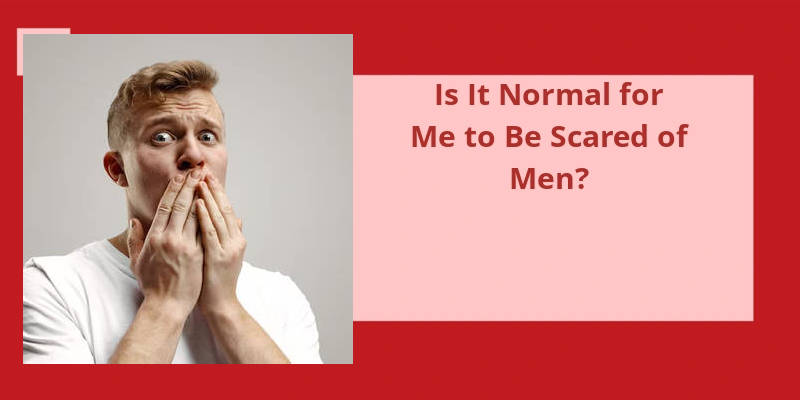Is it normal for me to be scared of men? This question is one that many individuals ask themselves, often feeling isolated and distressed by their own anxieties. It’s important to acknowledge that a fear of men can stem from various factors, particularly experiences encountered during childhood that have left a lasting impact. Traumatic or alarming encounters with males during this developmental stage can potentially result in androphobia, a fear or aversion towards men. Such experiences may even trigger post-traumatic stress disorder (PTSD), intensifying these feelings of fear and anxiety. Understanding the reasons behind this fear is crucial in finding a path towards healing and overcoming these deeply ingrained anxieties.
What Makes a Man Scared of a Woman?
It isn’t uncommon for men to feel intimidated or scared around women who possess qualities that challenge traditional gender norms. Research suggests that mens fears of women are most likely to be triggered when they encounter a woman who exhibits authority, strength, competence, self-confidence, or anger. These qualities can threaten their sense of power and dominance, leading to feelings of unease and fear.
It’s essential to acknowledge that these fears aren’t rational or justified, but rather a product of societal conditioning and personal insecurities. Men who experience fear or anxiety around women may benefit from examining and challenging these underlying beliefs and seeking support to overcome their fears. Engaging in open dialogue and fostering empathy between genders can also help break down these barriers and create a more inclusive and understanding society for everyone.
Strategies for Men to Address and Overcome Their Fears of Women.
- Recognize and acknowledge your fears.
- Identify the root cause of your fears.
- Challenge negative beliefs and thoughts about women.
- Practice self-compassion and self-acceptance.
- Seek therapy or counseling to work through your fears.
- Educate yourself about gender equality and women’s rights.
- Engage in non-threatening interactions with women.
- Build supportive friendships with women.
- Work on developing your self-confidence and self-esteem.
- Practice active listening and effective communication skills.
However, it’s important to recognize that gynophobia isn’t a universal sentiment among all men. It’s a complex issue that can stem from various personal and societal factors. In this article, we will delve deeper into the reasons behind this fear and it’s potential consequences, aiming to shed light on a subject that often remains unspoken.
What Does It Mean When a Man Fears a Woman?
It isn’t uncommon for individuals to experience fears or phobias, and fear of women is a topic that’s been explored over the years. Gynophobia, the fear of women, has been studied by historians in an attempt to understand it’s origins and the underlying causes. It’s believed that this fear stems from a deep-rooted anxiety about potential emasculation.
Emasculation is a term used to describe the process of depriving a man of his masculinity or male identity. This can manifest in various ways, such as feeling weak or inadequate in comparison to women. For some men, the fear of women may be a reflection of their own insecurities or a fear of losing power and control.
Understanding the reasons behind someones fear of women can often require professional help. Therapists or psychologists can provide insight into the underlying causes of this fear and work towards overcoming it. With proper guidance and support, individuals can learn to address their anxieties, develop self-confidence, and build healthier relationships with women.
It’s a complex issue that may stem from deep-seated insecurities or a fear of losing power and control. Seeking professional help can be beneficial for those struggling with gynophobia, as it can provide valuable insights and guidance towards overcoming this fear.
Source: Gynophobia: Definition, Symptoms, Causes, and Treatment
Androphobia, the extreme fear or anxiety of men, has gained attention in recent years due to the prominence of the Me Too movement. This fear can manifest in various ways, with some individuals experiencing intense phobic reactions even when presented with images of men. Let’s explore the causes, symptoms, and possible treatments for androphobia to better understand this psychological condition.
What Is the Fear of Being Around Men?
The fear of being around men, known as androphobia, is a genuine psychological condition that affects certain individuals. This condition manifests as extreme anxiety or fear specifically towards men. For some people, the mere sight or thought of men can trigger immediate symptoms of this phobia. This fear has been acknowledged for many years, but it’s gained considerable attention in recent times due to the prevalence and impact of the Me Too movement.
These experiences can shape an individuals perception and create irrational apprehension towards all men. It’s important to understand that this fear isn’t a reflection of every individuals encounters with men, but rather a specific response based on personal experiences.
The #MeToo movement has shed light on the experiences of countless women who’ve suffered from harassment or abuse at the hands of men. This increased awareness has sparked valuable conversations about power dynamics, consent, and gender equality. However, it’s also inadvertently contributed to the amplification of androphobia as a result of the collective attention given to mens actions.
They may feel an overwhelming sense of unease, anxiety, or dread in the presence of men. These individuals may actively avoid situations or environments where they anticipate encountering men, which can significantly impact their daily lives.
It’s crucial for individuals with androphobia to seek support from mental health professionals who can provide guidance and assist in developing coping strategies. Therapeutic interventions, such as cognitive-behavioral therapy, can help individuals challenge and reframe their fearful thoughts and beliefs. By understanding the underlying origins of androphobia and working towards overcoming it, individuals can find ways to manage their fear and lead fulfilling lives that aren’t limited by their anxieties.
Causes and Origins of Androphobia: Explore Potential Reasons Why Individuals Develop a Fear of Being Around Men, Such as Traumatic Experiences, Cultural Influences, or Learned Behaviors.
Androphobia, or the fear of men, can have various causes and origins. One possible reason is the experience of a traumatic event involving men. This could be a result of physical or verbal abuse, harassment, or any other negative encounter. These experiences can leave a lasting impact and create a fear response.
Cultural influences may also contribute to the development of androphobia. Societal norms, gender roles, and stereotypes can shape perceptions and beliefs about men, leading to fear or discomfort. Media portrayal of violent or aggressive men can further reinforce these fears.
Additionally, learned behaviors play a role in androphobia. Observing or hearing about others’ negative experiences with men can influence an individual’s beliefs and fears. Childhood upbringing and past relationships can also contribute to the fear of men.
It’s important to note that not everyone who experiences fear or anxiety around men has androphobia. If this fear significantly affects daily life and causes distress, it may be beneficial to seek professional help from a therapist or mental health expert who can provide guidance and support.
Fear is an intricate and deeply ingrained emotion that affects every individual differently. The triggers for fear vary widely, as they can range from common phobias to personal traumas. While the universal trigger for fear remains the threat of harm, whether it originates from reality or the depths of our imaginations, it’s essential to remember that fear is highly subjective. Consequently, what may provoke terror in one person may not hold the same power over another. In this article, we will explore the intricacies of fear and delve into the wide array of triggers that can evoke this powerful human emotion.
What Triggers Fear in Man?
Fear is a universal emotion that’s been ingrained in human beings since the dawn of time. It’s a natural response to stimuli that threatens our safety and well-being. For men, the triggers for fear can vary greatly, but one common trigger is the fear of harm. Whether it be physical, emotional, or psychological harm, the fundamental fear remains the same.
This fear is deeply rooted in our survival instincts and is often seen in situations where our physical well-being is at risk. Whether it be encountering a dangerous animal or facing a potential assailant, the fear of physical harm can be overwhelming.
This can manifest in various forms, such as the fear of rejection, abandonment, or betrayal. Men, just like women, have a natural desire for emotional connection and security. When this sense of emotional well-being is threatened, fear can arise as a means of self-preservation.
This can include the fear of failure, humiliation, or loss of control. The fear of not living up to societal expectations or personal standards can be particularly distressing. Men may feel the pressure to be strong, successful, and in control, and any perceived threat to these traits can trigger fear.
Aside from these universal triggers, men can also learn to become afraid of nearly anything through conditioning and personal experiences. Phobias, for instance, can develop as a result of a traumatic event or a learned behavior. This illustrates the malleability of fear and it’s ability to adapt to our individual circumstances.
While there are universal triggers, such as the fear of harm, each individual can develop their own unique fears based on conditioning and personal experiences. It’s important to recognize and address these fears, as they can greatly impact ones quality of life and relationships.
The Influence of Media and Popular Culture on Men’s Fears.
- The portrayal of violent crime in television shows and movies can instill fear in men, heightening their concerns about personal safety.
- Advertisements often promote unrealistic body standards, creating anxiety among men about their physical appearance and masculinity.
- Social media platforms can amplify societal pressures, as men compare themselves to idealized images and lifestyles portrayed online.
- The constant stream of news coverage and sensationalized headlines can perpetuate fears of terrorism, crime, and other potential threats.
- Mainstream media often portrays men as stoic and invulnerable, which can lead to feelings of inadequacy or fear of vulnerability.
- Exposure to horror films and supernatural content can contribute to irrational fears, such as fear of the dark or supernatural entities.
- Video games that depict graphic violence or horror themes may elicit fear and anxiety, especially among younger male audiences.
- Celebrity culture and tabloid media can create unrealistic expectations of success and wealth, causing anxiety about financial stability and social status.
- The portrayal of male characters in popular culture as aggressive or dangerous can reinforce stereotypes and fuel fears of male violence.
- The media’s focus on health risks and disease outbreaks can lead to heightened anxiety about personal health and well-being.
Conclusion
Overall, it isn’t uncommon for individuals to experience fear or apprehension towards men, particularly if they’ve had traumatic or harmful experiences in their past. It’s important to acknowledge and validate these feelings, as they can have a significant impact on one's daily life and relationships. Seeking support from mental health professionals can be beneficial in overcoming these fears and working towards healing and personal growth. Remember, everyone's experiences and emotions are valid, and it’s crucial to prioritize one's own well-being and mental health.






